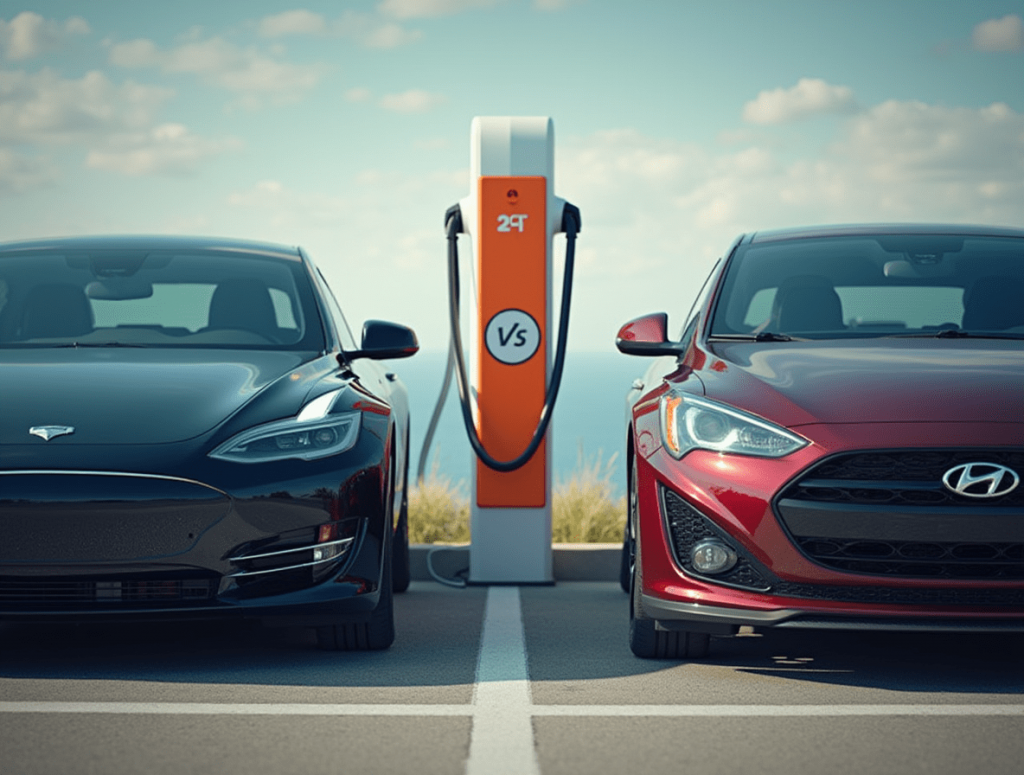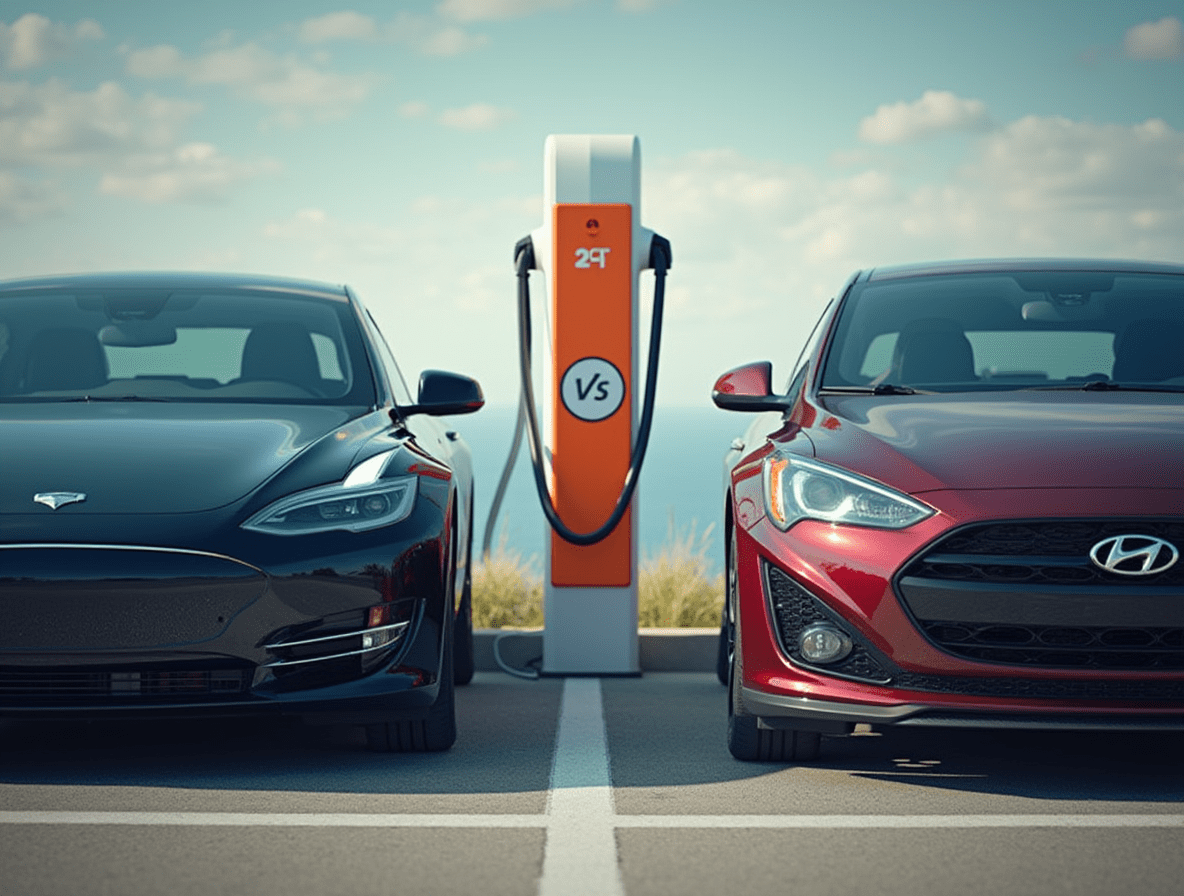
Did you know that the average American driver spends over $10,000 annually on vehicle expenses? With rising fuel costs and growing environmental concerns, many consumers are contemplating the switch to alternative fuel vehicles. The big question remains: electric or hybrid?
If you’re torn between these eco-friendly options, you’re not alone. The decision between electric vehicles (EVs) and hybrid cars involves balancing upfront costs against long-term savings—a calculation that varies based on driving habits, local electricity rates, and available incentives.
This comprehensive guide breaks down the true cost-effectiveness of electric and hybrid vehicles across purchase price, operating expenses, maintenance needs, and long-term ownership costs to help you make an informed decision for your wallet and lifestyle.
Understanding the Basics
What Are Electric Cars?
Electric vehicles run entirely on electricity stored in battery packs, producing zero tailpipe emissions. They’re charged by plugging into external power sources like home chargers or public charging stations.
Key components include:
- High-capacity battery pack (typically 40-100 kWh)
- Electric motor(s)
- Power electronics controller
- Charging system
What Are Hybrid Cars?
Hybrid vehicles combine a conventional internal combustion engine with an electric propulsion system. They come in several varieties:
- Standard Hybrids (HEVs): Cannot be plugged in; the battery charges through regenerative braking and the gasoline engine.
- Plug-in Hybrids (PHEVs): Feature larger batteries that can be charged by plugging into an electrical outlet, allowing for limited all-electric driving range.
- Mild Hybrids: Use a small electric motor primarily to assist the gasoline engine rather than drive the vehicle independently.
Upfront Costs: The Initial Investment
Electric Vehicle Purchase Prices
Electric vehicles typically carry higher sticker prices than their gasoline or hybrid counterparts. In 2025, most new EVs range from $35,000 to $70,000, though some luxury models exceed $100,000.
Price ranges by segment:
- Compact EVs: $35,000-$45,000
- Mid-size EVs: $45,000-$60,000
- SUV/Crossover EVs: $50,000-$70,000
- Luxury EVs: $70,000+
However, federal tax credits of up to $7,500 for qualifying vehicles, along with state and local incentives, can significantly reduce these costs. The Inflation Reduction Act has modified eligibility requirements, so research current incentives before purchasing.
Hybrid Vehicle Purchase Prices
Hybrid vehicles generally fall between conventional gas cars and fully electric vehicles in terms of purchase price:
Price ranges by segment:
- Compact hybrids: $25,000-$35,000
- Mid-size hybrids: $30,000-$40,000
- SUV/Crossover hybrids: $35,000-$50,000
- Luxury hybrids: $50,000+
Plug-in hybrids typically cost $3,000-$10,000 more than standard hybrids but may qualify for federal tax credits of up to $7,500 (with amount varying based on battery capacity).
Operating Costs: Day-to-Day Expenses
Fuel and Electricity Costs
Electric Vehicles
The cost to charge an electric vehicle depends primarily on your local electricity rates and the vehicle’s efficiency. As of 2025, the U.S. average electricity cost is approximately $0.16 per kilowatt-hour (kWh).
For a typical EV with 3-4 miles per kWh efficiency:
- Average cost per mile: $0.04-$0.05
- Annual cost for 15,000 miles: $600-$750
Many utilities offer reduced rates for off-peak charging, potentially lowering these costs by 30-50%.
Hybrid Vehicles
Standard hybrids combine gasoline efficiency with electric assistance:
- Average fuel economy: 45-55 MPG
- At $3.50 per gallon: $0.06-$0.08 per mile
- Annual cost for 15,000 miles: $900-$1,200
Plug-in hybrids offer even greater savings when regularly charged:
- Electric-only range: 25-50 miles
- When operating in electric mode: similar costs to EVs
- When operating in hybrid mode: similar costs to standard hybrids
- Potential annual cost for 15,000 miles (with regular charging): $700-$1,000
Maintenance Expenses
Electric Vehicles
Electric vehicles have significantly fewer moving parts than combustion engine vehicles, resulting in reduced maintenance needs:
- No oil changes required
- Brake wear is reduced due to regenerative braking
- Fewer fluid replacements and tune-ups needed
- No transmission maintenance for most models
Average annual maintenance cost: $300-$500
The primary long-term expense is battery replacement, which typically occurs after 8-15 years. While current prices range from $5,000-$15,000, costs continue to decline as technology advances.
Hybrid Vehicles
Hybrids combine both systems, resulting in maintenance requirements that fall between conventional and electric vehicles:
- Regular oil changes (though less frequent than conventional vehicles)
- Both electric and combustion components require service
- Regenerative braking reduces brake wear
- Battery systems typically warranted for 8-10 years/100,000+ miles
Average annual maintenance cost: $500-$700
Infrastructure Considerations
Charging Infrastructure for EVs
Home charging options:
- Level 1 (standard 120V outlet): $0-$300 for equipment
- Level 2 (240V): $500-$2,000 installed
Public charging network access:
- Level 2 public charging: Often $0.20-$0.50 per kWh
- DC Fast Charging: $0.30-$0.60 per kWh or $10-$15 per session
While charging infrastructure continues to expand rapidly, availability varies significantly by region. Urban and suburban areas typically offer abundant options, while rural areas may present challenges for longer trips.
Fueling Infrastructure for Hybrids
Hybrids offer flexibility with:
- Universal access to gas stations
- For PHEVs: Home charging using standard outlets or Level 2 chargers
- No range anxiety on longer trips
This infrastructure flexibility represents a significant advantage for drivers concerned about charging availability or those who frequently travel beyond urban centers.
Long-Term Value: Total Cost of Ownership
Depreciation Rates
Traditionally, electric vehicles depreciated faster than conventional vehicles, but this trend has shifted in recent years:
- Modern EVs from established manufacturers now hold value comparable to conventional vehicles
- Premium EVs like Tesla models have demonstrated strong resale values
- Older EV models still suffer from more severe depreciation due to rapidly advancing technology
Hybrids generally experience:
- Standard depreciation similar to conventional vehicles
- Strong resale values for established models like the Toyota Prius
- Lower depreciation compared to early-generation EVs
Insurance Costs
On average, electric vehicles cost 15-25% more to insure than comparable gas vehicles due to:
- Higher repair costs for specialized components
- More expensive replacement parts
- Advanced technology systems
Hybrids typically see insurance costs about 5-10% higher than conventional vehicles.
Lifetime Cost Analysis
For a comprehensive comparison, let’s examine the 5-year total cost of ownership for comparable electric, hybrid, and conventional vehicles in the mid-size segment:
Electric Vehicle:
- Purchase price (after incentives): $40,000
- Electricity costs: $3,250
- Maintenance: $1,750
- Insurance premium: $7,500
- Depreciation: $21,000
- Total 5-year cost: $73,500
Plug-in Hybrid:
- Purchase price (after incentives): $37,000
- Fuel/electricity costs: $4,500
- Maintenance: $3,000
- Insurance premium: $6,750
- Depreciation: $20,000
- Total 5-year cost: $71,250
Standard Hybrid:
- Purchase price: $35,000
- Fuel costs: $5,500
- Maintenance: $3,250
- Insurance premium: $6,500
- Depreciation: $19,000
- Total 5-year cost: $69,250
Conventional Vehicle:
- Purchase price: $32,000
- Fuel costs: $9,500
- Maintenance: $4,000
- Insurance premium: $6,250
- Depreciation: $18,000
- Total 5-year cost: $69,750
This analysis suggests that while conventional vehicles offer lower upfront costs, their higher operating expenses typically erase these savings over time. Standard hybrids often present the lowest 5-year ownership costs, while electric vehicles become increasingly competitive for drivers who keep their cars longer.
Key Factors Affecting Cost-Effectiveness
Several variables can significantly impact which vehicle type offers better value for individual drivers:
Driving Patterns
- High-mileage drivers benefit more from EVs and hybrids
- Short daily commutes maximize PHEV efficiency
- Frequent long trips favor hybrids over pure electric
Local Factors
- Electricity rates vary significantly by region
- Gas prices fluctuate based on location and global markets
- Available incentives differ by state and locality
Charging Access
- Home charging capability dramatically improves EV economics
- Apartment dwellers without dedicated charging may find hybrids more practical
- Workplace charging can provide significant savings
Conclusion: Which is More Cost-Effective?
The cost-effectiveness comparison between electric and hybrid vehicles isn’t one-size-fits-all. Based on our analysis:
Electric vehicles offer superior long-term value for:
- Drivers with access to home or workplace charging
- High-mileage commuters
- Those planning to keep their vehicle 7+ years
- Regions with low electricity costs and strong incentives
Hybrid vehicles provide better cost-effectiveness for:
- Drivers without reliable charging access
- Those who frequently take long trips
- Consumers with shorter anticipated ownership periods
- Areas with minimal EV incentives
As battery technology continues to improve and production scales up, electric vehicles are trending toward price parity with conventional vehicles. Meanwhile, hybrids offer an excellent transitional technology that balances efficiency with flexibility.
The most cost-effective choice ultimately depends on your specific circumstances, driving habits, and local conditions. Consider tracking your typical driving patterns for a month before making a decision to determine which technology aligns best with your lifestyle and budget.
FAQ Section
How long do EV batteries last?
Most electric vehicle batteries are designed to last 8-15 years or 100,000-150,000 miles before significant capacity degradation occurs. Manufacturers typically provide warranties covering battery performance for 8-10 years.
Do hybrids require special maintenance?
While hybrids incorporate additional components, their maintenance requirements aren’t significantly different from conventional vehicles. Regular oil changes and inspections are still necessary, though regenerative braking systems often extend brake life considerably.
Can I install a home charger in a rental property?
Installation in rental properties typically requires landlord permission. Some utility companies offer incentive programs for landlords to install charging equipment. Alternatively, PHEV owners can often rely on standard outlets for overnight charging.
How do extreme temperatures affect EV range?
Cold weather can reduce EV range by 10-40% due to increased HVAC use and reduced battery efficiency. Extreme heat affects range less severely but accelerates battery degradation over time. Hybrids experience smaller efficiency impacts in extreme temperatures.
Are there subscription costs for public charging networks?
Many charging networks offer both pay-as-you-go options and optional membership plans with reduced rates. Monthly subscriptions typically range from $5-$15 and may provide discounted charging rates. Some vehicle manufacturers include complimentary charging network access for new purchases.














